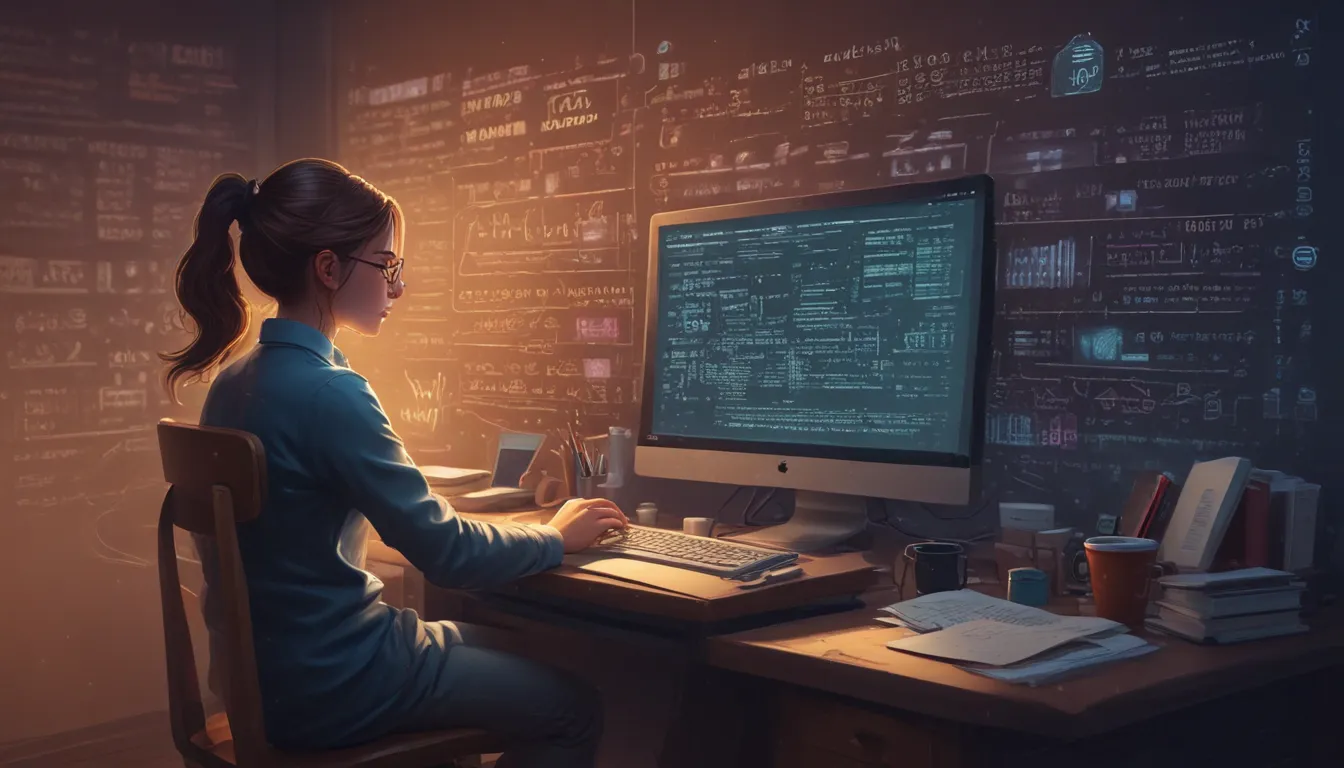A Note About Images: The images used in our articles are for illustration purposes only and may not exactly match the content. They are meant to engage readers, but the text should be relied upon for accurate information.
Welcome to the captivating realm of coding, where creativity meets technology to shape the future. While coding may appear daunting, there are plenty of entertaining aspects waiting to be discovered. Join us on a thrilling journey through the world of coding fun facts that will not only entertain but also inspire you to delve deeper into this exciting field. So, buckle up as we explore the incredible world of coding!
Understanding Coding
Coding is the process of creating instructions or algorithms that computers can understand and execute. It involves using programming languages to develop software, websites, apps, and more. Through coding, we can bring ideas to life and build technological solutions that define our modern world.
Pioneers of Programming
In the 19th century, Ada Lovelace, an English mathematician, made history by writing the first algorithm intended for implementation on Charles Babbage’s Analytical Engine. Her visionary work laid the foundation for modern programming, earning her the title of the world’s first computer programmer.
Evolution of Modern Coding
The concept of coding, as we know it today, blossomed with the development of electronic computers in the mid-20th century, revolutionizing the way we interact with technology.
The Foundation of Digital Coding
The binary system, invented by German philosopher and mathematician Gottfried Wilhelm Leibniz, forms the cornerstone of digital coding. Representing information using only two digits, 0 and 1, the binary system laid the groundwork for the digital world we inhabit today.
The Birth of Debugging
The term “debugging,” referring to the process of identifying and resolving errors in code, originated from an unexpected source. Computer scientist Grace Hopper discovered a moth trapped in a relay of the Harvard Mark II computer in 1947, leading to the term “debugging” as we know it today.
Impact on Entrepreneurship
In today’s digital era, coding skills play a pivotal role in entrepreneurship and innovation. Surprisingly, about one-third of the companies on the Fortune 500 list were founded by individuals with coding backgrounds, underscoring the profound impact of coding on shaping our business landscape.
Technological Milestones
The Apollo Guidance Computer, which guided the Apollo space missions to the moon, operated with a mere 64 kilobytes of memory. In comparison, modern smartphones boast memory capacities hundreds of thousands of times greater, showcasing the remarkable progress in technology.
Unveiling the First Computer Bug
The term “bug” commonly used in coding to denote errors, stems from an actual incident involving a moth found in a relay of the Harvard Mark II computer. This incident became synonymous with coding errors, giving birth to the enduring metaphor of a “bug” in the system.
Hidden Surprises in Code
Software developers often embed secret surprises, known as “Easter eggs,” in their creations. These hidden gems can take the form of secret messages, mini-games, or whimsical elements, adding an element of delight to the user experience.
Enduring Innovations in Coding
In the 1950s, computer scientist Grace Hopper spearheaded the creation of COBOL (Common Business-Oriented Language), a pioneering language that revolutionized business applications and continues to be used today. COBOL stands as a testament to the enduring impact of coding innovations.
New Era of Web Development
The emergence of the internet in the late 20th century precipitated the need for coding languages tailored for webpage creation. HTML (Hypertext Markup Language) emerged as the foundational language for structuring and presenting content on the burgeoning World Wide Web.
Revolutionary Programming Languages
Fortran, developed in the 1950s, marked the advent of high-level programming languages, revolutionizing scientific and numerical computing. Its innovative approach paved the way for subsequent programming languages, shaping the coding landscape.
Influence of C Programming
C, a powerful and widely used programming language created in the 1970s, exerts a significant influence on the development of numerous other languages, serving as the cornerstone for systems programming.
The Allure of Python
Python, known for its simplicity and readability, draws inspiration from the British comedy group Monty Python. Guido van Rossum, the language’s creator, infused a sense of fun by naming his programming language after the renowned comedy troupe.
Unraveling JavaScript
Contrary to popular belief, JavaScript, a prominent language for web development, shares no relation to Java. The selection of its name was strategic, capitalizing on the popularity of Java in the 1990s to garner widespread recognition.
Esoteric Languages: A Curious Realm
Esoteric programming languages, such as “Brainfuck,” “Whitespace,” and “Chef,” present a unique challenge with their intentionally obscure syntax and complex instructions. These languages cater to enthusiasts seeking an unconventional coding experience.
Delving into Assembly Language
Assembly language serves as a low-level programming language that establishes a direct correspondence between code instructions and the computer’s hardware architecture. Mastering assembly language necessitates a profound understanding of a computer’s internal workings.
Coding in Pop Culture
The iconic film “The Matrix” propelled the notion of a virtual reality realm into popular culture, introducing audiences to the concept of “hacking.” The memorable “green code rain” scenes depicted symbols reminiscent of falling code, captivating viewers with its cyberpunk aesthetic.
Captivating TV Series: “Mr. Robot”
The television series “Mr. Robot” enraptured audiences with its authentic portrayal of hacking and cybersecurity. The show’s protagonist, Elliot Alderson, mesmerizes viewers with his coding prowess as he navigates the intricacies of societal underbellies.
Unveiling a Dystopian Future: “Ready Player One”
The novel and subsequent film adaptation, “Ready Player One,” envision a dystopian future where coding and virtual reality serve as linchpins in the protagonist’s quest for an elusive prize. The narrative underscores the transformative power of coding in shaping alternate realities.
Educational Coding Toys
In recent years, a surge in coding toys, such as LEGO Mindstorms and littleBits, has garnered popularity among children. These interactive toys offer a playful introduction to coding concepts, igniting a passion for programming in the future generation.
Embracing the World of Coding
Coding transcends mere technicalities to become a dynamic field brimming with surprises and engaging details. Whether you’re a seasoned programmer or a curious beginner, these coding fun facts offer a glimpse into the enthralling world of programming. Embrace your curiosity, embark on your coding journey, and unlock the boundless possibilities that await in this ever-evolving domain.
FAQs: Navigating the Coding Landscape
Is a computer science degree necessary to learn coding?
No, a computer science degree is not a prerequisite for learning coding. Many successful programmers are self-taught or have pursued alternative educational paths. Online resources, coding boot camps, and community programs offer diverse avenues for acquiring coding skills.
Which programming language is ideal for beginners?
The choice of the initial programming language hinges on individual goals and interests. Python, renowned for its simplicity and versatility, often serves as an excellent starting point for beginners. However, languages like JavaScript, Java, and C++ also possess unique advantages tailored to specific applications.
Is coding exclusive to individuals with a mathematical aptitude?
While coding involves logical thinking and problem-solving, it welcomes individuals from varied backgrounds, not limited to those inclined towards mathematics. Creativity, critical thinking, and the ability to dissect complex problems into manageable tasks are integral components of coding, accommodating a diverse array of individuals.
Can a career in coding yield success?
Absolutely, coding presents vast opportunities for a successful and fulfilling career. With the escalating demand for technology professionals, avenues in software development, web development, data science, cybersecurity, and more abound. Continuous learning and staying abreast of industry trends are pivotal for cultivating a thriving career in coding.
How can one maintain motivation while learning coding?
Navigating the learning curve of coding can be challenging, but sustaining motivation is essential. Setting clear goals, breaking down projects into manageable segments, celebrating progress, seeking guidance from coding communities and mentors, and engaging in projects aligned with personal interests can bolster motivation and enrich the learning journey.
Unleashing the World of Coding
Embark on a riveting exploration of the captivating world of coding, where innovation, creativity, and endless possibilities intersect to shape our digital landscape. Delve into the realm of programming armed with newfound knowledge and a sense of wonder. Let these coding fun facts ignite your passion for coding and propel you towards a future teeming with promise and potential. Embrace the journey, unravel the mysteries of coding, and witness the transformative power it holds in creating a brighter tomorrow. Happy coding!
In our commitment to deliver enriching content, we strive to provide you with authoritative and captivating insights into the world of coding. Each fact shared on our platform is contributed by real users like you, ensuring a diverse and credible array of information. Our dedicated editors rigorously review each submission to maintain the highest standards of accuracy, reliability, and authenticity. Trust in our dedication to quality and authenticity as you explore, learn, and uncover the enchanting world of coding with us.






